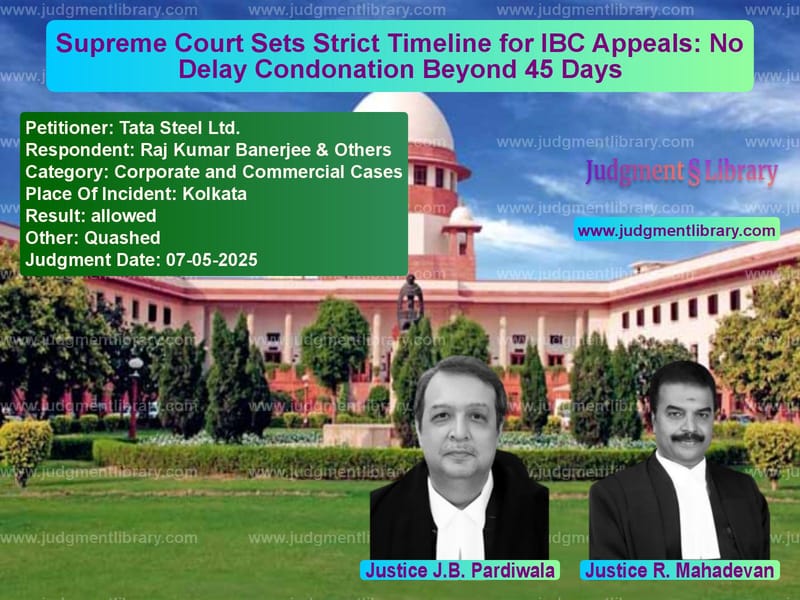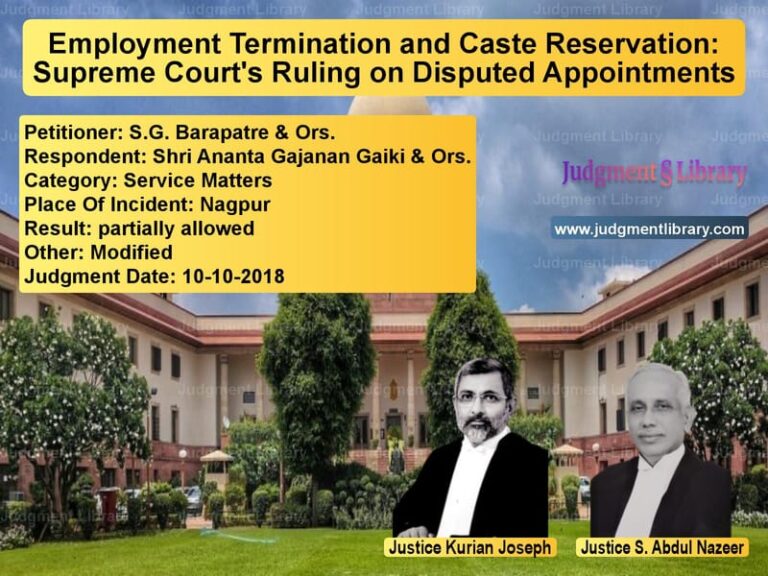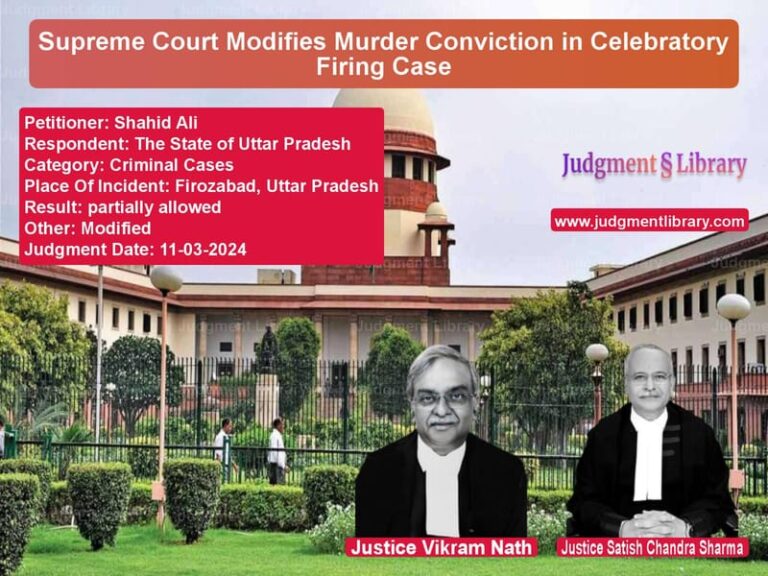Supreme Court Sets Strict Timeline for IBC Appeals: No Delay Condonation Beyond 45 Days
In a significant judgment that reinforces the time-bound nature of insolvency proceedings in India, the Supreme Court has delivered a crucial verdict clarifying the strict limitation periods for filing appeals under the Insolvency and Bankruptcy Code (IBC). The case of Tata Steel Ltd. versus Raj Kumar Banerjee & Others represents a landmark decision that underscores the importance of adhering to statutory timelines in corporate insolvency resolution processes, ensuring that the objectives of the IBC are not defeated by delayed litigation.
The dispute centered around a critical question that has far-reaching implications for corporate insolvency proceedings: How strictly must parties adhere to the limitation periods prescribed under the IBC for filing appeals, and what powers do appellate tribunals have to condone delays beyond the statutory maximum? The Supreme Court’s answer was clear and unequivocal—the timelines under IBC are sacrosanct, and even a single day’s delay beyond the maximum permissible period cannot be condoned.
At the heart of this legal battle was Tata Steel Ltd., which had emerged as the successful resolution applicant for Rohit Ferro-Tech Limited (the Corporate Debtor). The company’s resolution plan had been approved by both the Committee of Creditors and the National Company Law Tribunal (NCLT) in Kolkata through an order dated April 7, 2022. However, this approval was challenged by Raj Kumar Banerjee, an erstwhile minority shareholder of the Corporate Debtor, who filed an appeal before the National Company Law Appellate Tribunal (NCLAT) with a delay of 15 days.
The Legal Framework and Timeline Dispute
The case revolved around the interpretation of Section 61(2) of the IBC, which governs appeals against orders passed by the NCLT. This provision establishes a strict timeline: “Every appeal under sub-section (1) shall be filed within thirty days before the National Company Law Appellate Tribunal: Provided that the National Company Law Appellate Tribunal may allow an appeal to be filed after the expiry of the said period of thirty days if it is satisfied that there was sufficient cause for not filing the appeal but such period shall not exceed fifteen days.”
This creates a maximum window of 45 days for filing appeals—30 days as the standard limitation period, plus an additional 15 days that may be condoned upon showing sufficient cause. The fundamental question before the Supreme Court was whether the NCLAT had the authority to condone delays beyond this 45-day maximum period.
In this specific case, the NCLT had approved Tata Steel’s resolution plan on April 7, 2022. According to Tata Steel’s calculation, the 30-day limitation period expired on May 7, 2022, and the additional 15-day condonable period ended on May 22, 2022. However, Raj Kumar Banerjee e-filed his appeal on May 23, 2022 (the 46th day) and physically filed it on May 24, 2022 (the 47th day). The NCLAT nevertheless condoned the delay, leading to Tata Steel’s appeal before the Supreme Court.
Tata Steel’s Arguments
The learned counsel for Tata Steel presented a compelling case based on strict statutory interpretation. He argued that “the NCLT passed the order approving the appellant’s resolution plan for the Corporate Debtor under Section 31 IBC on 07.04.2022. In terms of Section 61(2) IBC, the limitation period of 30 days for filing an appeal against the said order expired on 07.05.2022.” Even accounting for potential extensions, “the additional / grace/ condonable period of 15 days as provided under the proviso to Section 61(2), expired on 22.05.2022. Therefore, the right of Respondent No.1 to file an appeal stood extinguished on 22.05.2022 itself.”
The counsel emphasized that “after the expiry of the 30-day limitation period and the additional 15-day grace / condonable period, Respondent No. 1 e-filed the appeal along with an application for condonation of delay before the NCLAT, on 23.05.2022, which was the 46th day from the date of the NCLT’s order.” This placed the appeal clearly beyond the statutory maximum period.
Regarding the NCLAT’s reasoning that May 7, 2022, was a Saturday and therefore a court holiday, Tata Steel’s counsel relied on the judgment in Ajay Gupta v. Raju @ Rajendra Singh Yadav, submitting that “the benefit of Section 4 of the Limitation Act, 1963 is not attracted where the last day for filing falls on a working Saturday, and the court registry is open. It has been judicially recognized that while Saturday may be a non-working day for the judges, it remains a working day for the registry.”
The counsel also cited several precedents, including V. Nagarajan v. SKS Ispat Powers Limited & Others and Kalpraj Dharamshi & Another v. Kotak Investment Advisors Limited & Another, where the Supreme Court had “held that a litigant under Section 61 IBC can file an appeal before the NCLAT within 30 days, which may be extended by a further period of up to 15 days upon showing sufficient cause; and no appeal can be entertained beyond this extended period.”
Raj Kumar Banerjee’s Defense
Respondent No. 1, Raj Kumar Banerjee, presented a different interpretation of the timeline. His counsel argued that “the appeal filed by Respondent No. 1 before the NCLAT is well within the statutorily condonable period of 15 days as mentioned in the proviso of Section 61(2) IBC.”
The respondent’s key contention was that the limitation period should not be calculated from the date of the NCLT order (April 7, 2022) but from when he actually became aware of it. He submitted that “pursuant to the approval of the resolution plan, an intimation letter was issued by the Corporate Debtor to the Listing Departments of Bombay Stock Exchange and National Stock Exchange of India Limited on 08.04.2022. This was the first time, on which Respondent No.1 became aware of the approval of the resolution plan.”
Based on this awareness argument, the respondent calculated that “the initial limitation period of 30 days (22 days in April 2022 + 8 days in May 2022) ended on 08.05.2022, which was a Sunday.” Applying Section 4 of the Limitation Act, he contended that “when the last day falls on a holiday, the period extends to the next working day. Hence, the limitation period ended on 09.05.2022 (Monday). Thereafter, the statutory condonable period of 15 days commenced from 10.05.2022 and ended on 24.05.2022.”
The respondent also raised substantive arguments about procedural lapses, stating that “the Resolution Professional of the Corporate Debtor has failed to comply with the disclosure obligations mandated under the SEBI (Listing Obligation and Disclosure Requirements) Regulations, 2015. This failure directly contributed to the delay in filing the appeal before the NCLAT.”
Furthermore, the respondent emphasized his status as a non-party to the original proceedings, arguing that “Respondent No. 1 was not a party to the petition filed under Section 7 IBC and therefore, was not in possession of the relevant documents required to file an appeal under Section 61. This lack of access to essential documents contributed to the delay in filing the appeal.”
The Supreme Court’s Analysis and Reasoning
The Supreme Court, in its judgment authored by Justice R. Mahadevan, conducted a thorough analysis of the legal framework and precedents. The Court framed two central issues for determination: whether the appeal filed by Respondent No. 1 was within the prescribed limitation period of 30 days along with the additional condonable period of 15 days under Section 61(2) IBC; and if not, whether the NCLAT had the power to condone the delay beyond this prescribed period.
On the first issue, the Court meticulously examined the timeline and the application of the Limitation Act. The Court noted that “the total permissible period for filing an appeal under section 61(2) is 45 days – comprising 30 days as the prescribed period and an additional 15 days that may be condoned upon showing sufficient cause.”
The Court rejected the respondent’s argument that the limitation period should run from when he became aware of the order, relying on its earlier decision in V. Nagarajan v. SKS Ispat & Power Ltd. where it was held that “under section 61(2) IBC, the limitation period for filing an appeal to the NCLAT commences from the date of pronouncement of the order by the NCLT, not from the date when the order is received or made available to the aggrieved party.”
The Court also addressed the respondent’s reliance on Section 4 of the Limitation Act, which provides that when the prescribed period expires on a day when the court is closed, the filing may be done on the next working day. However, the Court drew a crucial distinction, citing its decisions in Assam Urban Water Supply & Sewerage Board v. M/s. Subash Projects & Mktg. Ltd. and Sagufa Ahmed and Others v. Upper Assam Plywood Products (P) Ltd. & Others, where it was held that “the benefit of exclusion of period during which the court is closed shall be available when the application is filed within ‘prescribed period of limitation’ and shall not be available in respect of period extendable by court in exercise of its discretion.”
The Court explained that “the expression ‘prescribed period’ appearing in Section 4 cannot be construed to mean anything other than the period of limitation. Any period beyond the prescribed period, during which the court or tribunal has the discretion to allow a person to institute the proceedings, cannot be taken to be ‘prescribed period’.”
On the factual matrix, the Court found that “the Company Secretary of the Corporate Debtor duly informed the listing departments of both NSE and BSE about the NCLT order dated 07.04.2022 within 30 minutes of its pronouncement. Hence, the limitation period for filing the appeal commenced on 07.04.2022 and expired on 07.05.2022.” The Court noted that “07.05.2022 fell on the first Saturday of the month, which is a working day for the Registry of the NCLAT.”
Most significantly, the Court concluded that “Respondent No. 1 filed the appeal beyond the statutory maximum period of 45 days prescribed under section 61(2) IBC.”
The Court’s Ruling on NCLAT’s Powers
On the second issue regarding the NCLAT’s power to condone delay, the Supreme Court was unequivocal. The Court emphasized that “the IBC prescribes strict timelines for filing appeals and taking legal action so as to ensure that insolvency proceedings are not misused to recover time-barred debts. The proviso to Section 61(2) clearly limits the NCLAT’s jurisdiction to condone delay only up to 15 days beyond the initial 30-day period.”
The Court firmly stated that “where a statute expressly limits the period within which delay may be condoned, an Appellate Tribunal cannot exceed that limit. In other words, the NCLAT being a creature of statute, operates strictly within the powers conferred upon it. Unlike a civil suit, it lacks inherent jurisdiction to extend time on equitable grounds.”
In a particularly strong passage, the Court declared that “once the prescribed and condonable periods (i.e., 30 + 15 days) expire, the NCLAT has no jurisdiction to entertain appeals, regardless of the reason for the delay.”
The Court relied on its earlier decision in Kalpraj Dharanshi v. Kotak Investment Advisors Limited & Another, where it had “categorically held that the NCLAT cannot condone any delay beyond 15 days even on equitable grounds; and that the appellate mechanism under IBC is strictly time-bound by design to preserve the speed and certainty of the insolvency resolution process.”
The Final Judgment and Broader Implications
In its concluding remarks, the Supreme Court delivered a powerful message about the importance of adhering to statutory timelines in insolvency proceedings. The Court observed that “time is of the essence in statutory appeals, and the prescribed limitation period must be strictly adhered to. Even a delay of a single day is fatal if the statute does not provide for its condonation.”
The Court warned that “allowing condonation in such cases would defeat the legislative intent and open the floodgates to belated and potentially frivolous petitions, thereby undermining the efficacy and finality of the appellate mechanism.”
Accordingly, the Supreme Court “set aside the order dated 14.12.2022 passed by the NCLAT in I.A.No.1667 of 2022 in CA (AT) (Insolvency) No.615 of 2022” and allowed Tata Steel’s appeal.
This judgment has significant implications for corporate insolvency proceedings in India. It reinforces the time-bound nature of the IBC and ensures that successful resolution applicants can proceed with implementation without facing indefinite challenges from dissenting stakeholders. The decision provides much-needed certainty to the corporate insolvency resolution process and underscores the Supreme Court’s commitment to preserving the efficiency and effectiveness of the IBC framework.
For stakeholders in insolvency proceedings, this judgment serves as a clear reminder that statutory timelines must be strictly observed, and that courts and tribunals will not exercise powers beyond what is expressly conferred by statute, even in the interest of equity or substantial justice. The ruling strengthens the foundational principles of the IBC—speed, certainty, and finality—which are essential for the successful resolution of corporate distress and the protection of economic value.
Petitioner Name: Tata Steel Ltd..Respondent Name: Raj Kumar Banerjee & Others.Judgment By: Justice J.B. Pardiwala, Justice R. Mahadevan.Place Of Incident: Kolkata.Judgment Date: 07-05-2025.Result: allowed.
Don’t miss out on the full details! Download the complete judgment in PDF format below and gain valuable insights instantly!
Download Judgment: tata-steel-ltd.-vs-raj-kumar-banerjee-&-supreme-court-of-india-judgment-dated-07-05-2025.pdf
Directly Download Judgment: Directly download this Judgment
See all petitions in Bankruptcy and Insolvency
See all petitions in Corporate Compliance
See all petitions in Company Law
See all petitions in Corporate Governance
See all petitions in Shareholder Disputes
See all petitions in Judgment by J.B. Pardiwala
See all petitions in Judgment by R. Mahadevan
See all petitions in allowed
See all petitions in Quashed
See all petitions in supreme court of India judgments May 2025
See all petitions in 2025 judgments
See all posts in Corporate and Commercial Cases Category
See all allowed petitions in Corporate and Commercial Cases Category
See all Dismissed petitions in Corporate and Commercial Cases Category
See all partially allowed petitions in Corporate and Commercial Cases Category







